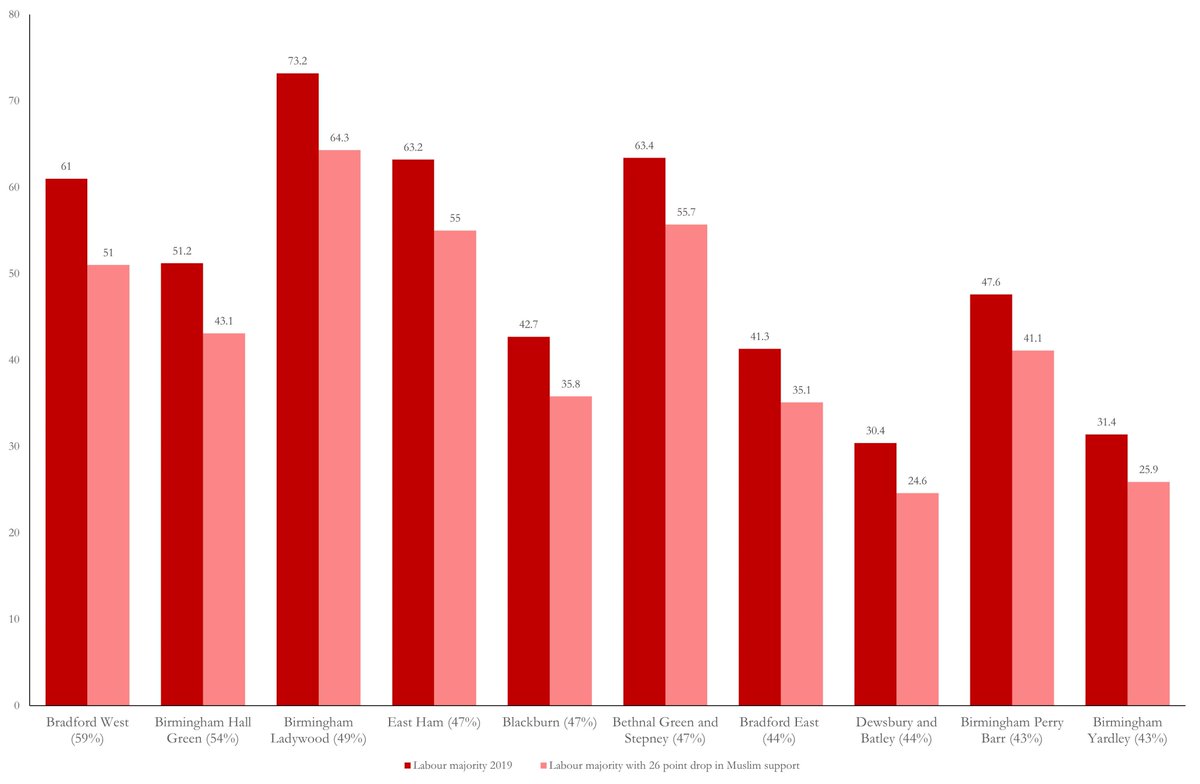Brexitland is out today! To celebrate the release of our new book I'm going to put up a graph a day here highlighting some of the big themes we discuss.
Graph 1: share of graduates and school leavers in the population 1986-2016
Graph 1: share of graduates and school leavers in the population 1986-2016
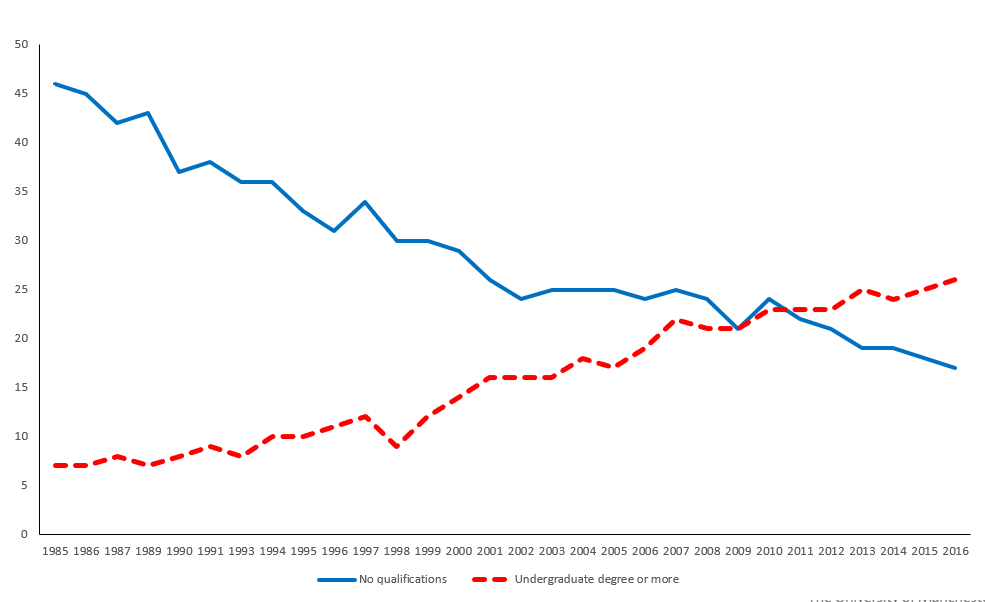
Educational expansion has reshaped our nation over past few decades. In the Thatcher years, nearly half of voters had no educational qualifications at all, and fewer than 10% had a university degree.
School leavers outnumbers graduates 2:1 when Blair was first elected in 1997
School leavers outnumbers graduates 2:1 when Blair was first elected in 1997
By the time of the EU referendum, graduates were one quarter of the electorate, and voters with no qualifications had fallen to 20%.
The shift is still ongoing - the share of graduates rises about 0.7 points a year, the share with GCSEs or less declines over a point a year
The shift is still ongoing - the share of graduates rises about 0.7 points a year, the share with GCSEs or less declines over a point a year
Why does this matter? Educational qualifications strongly predict differences in identity attachments and values.
On issues such as national identity, immigration, the EU and diversity, education is a far stronger predictor of views than class or economic ideology
On issues such as national identity, immigration, the EU and diversity, education is a far stronger predictor of views than class or economic ideology
The social roots of our current polarised politics on such issues lie in this fundamental democratic shift, with Britain gradually moving from a society where school leavers dominate and set the tone to one where graduates increasingly do so.
Plenty more discussion of this in the book! Available here:
cambridge.org/gb/academic/su…
amazon.co.uk/Brexitland-Ide…
cambridge.org/gb/academic/su…
amazon.co.uk/Brexitland-Ide…
Time for graph 2: this shows the second big demographic trend driving political change in Britain - rising diversity. This chart shows the share of British residents from ethnic minority backgrounds in censuses from 1951-2011. Next year's census will reveal a further sharp rise 
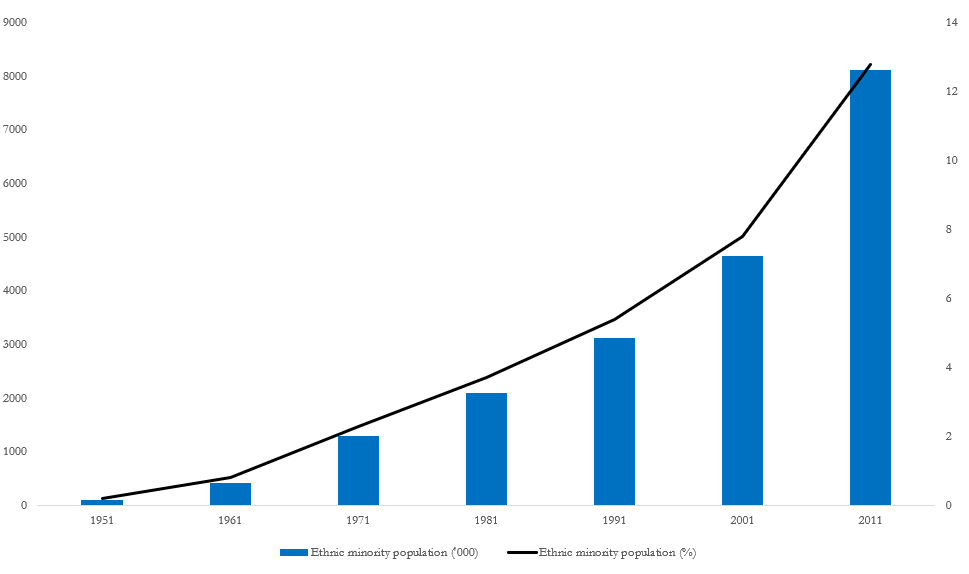
This accelerating rise in ethnic diversity matters politically because, as we show in the book, ethnic minorities have distinctive political priorities and behaviour, and different reactions to diversity and cultural change also have an important impact on how white voters behave
Third graph of the day illustrates one big reason why educational expansion and ethnic change matter: ethnocentrism. White school leavers express strong attachments to narrow, exclusionary forms of national identity. Graduates and ethnic minorities reject these @ProfSobolewska 
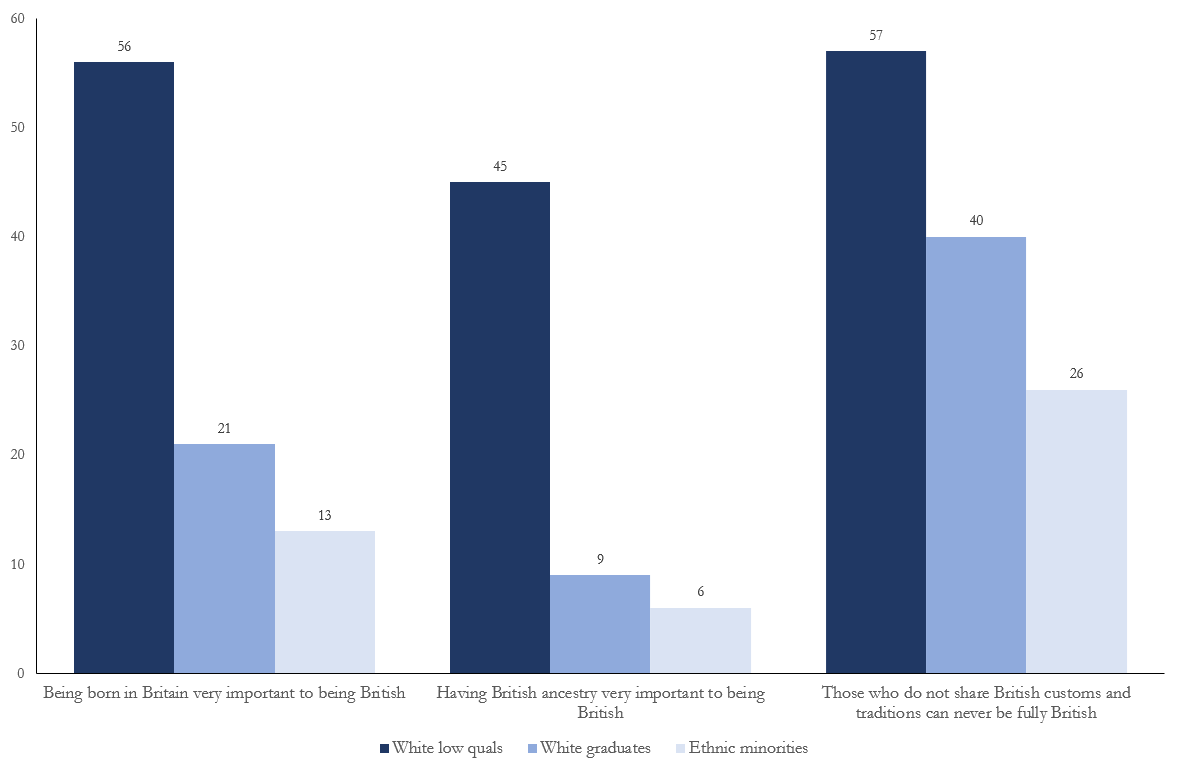
The same pattern recurs on many other measures - views of immigration, negative stereotypes of ethnic minorities & other outgroups,desire for social distance from outgroups and so on. White school leavers tend to see politics in terms of "us against them"; grads & EMs reject this
As always, if you'd like to learn more, Brexitland is available to buy here:
amazon.co.uk/Brexitland-Ide…
cambridge.org/gb/academic/su…
amazon.co.uk/Brexitland-Ide…
cambridge.org/gb/academic/su…
Time for today's daily graph. This one's a blast from the past. In 1967, Gallup asked voters whether they thought Britain had benefitted from immigration or been harmed by it. The twist was that half were randomly assigned to be asked about Commonwealth imm, half abt Irish imm 
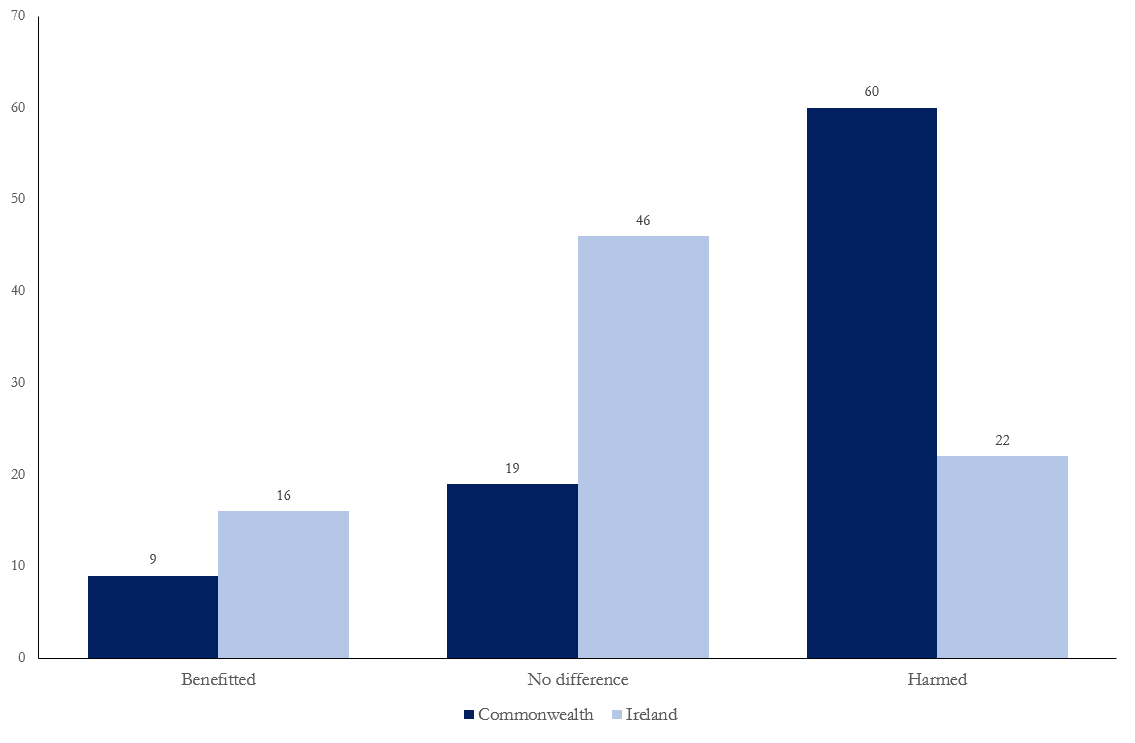
The share who saw Commonwealth immigration (then overwhelmingly interpreted as immigration from black and Asian Commonwealth members) as harmful was 60%, nearly three times the level for white Irish immigration (22%), though the latter was a larger source of immigration
What this underlines is the powerful impact of ethnocentric, "us against them" sentiment in driving reactions to immigration. Commonwealth imms were much more often seen as a threatening "other" by ethnocentric voters, driving much stronger opposition to their settlement
This opposition would produce political turmoil a year after this poll was fielded, when Enoch Powell gave his infamous "Rivers of Blood" speech
Plenty more in the book, where we review the history of immigration politics in Britain, and why the events of the 1960s and 1970s continued to echo through to the present day:
amazon.co.uk/Brexitland-Ide…
cambridge.org/gb/academic/su…
amazon.co.uk/Brexitland-Ide…
cambridge.org/gb/academic/su…
Time for the Brexitland graph of the day! Alongside demographic change, political change also helps set the scene for our current disruption. This latest graph charts decline in partisan attachments in the electorate from the 1980s to the start of the Coalition @ProfSobolewska 
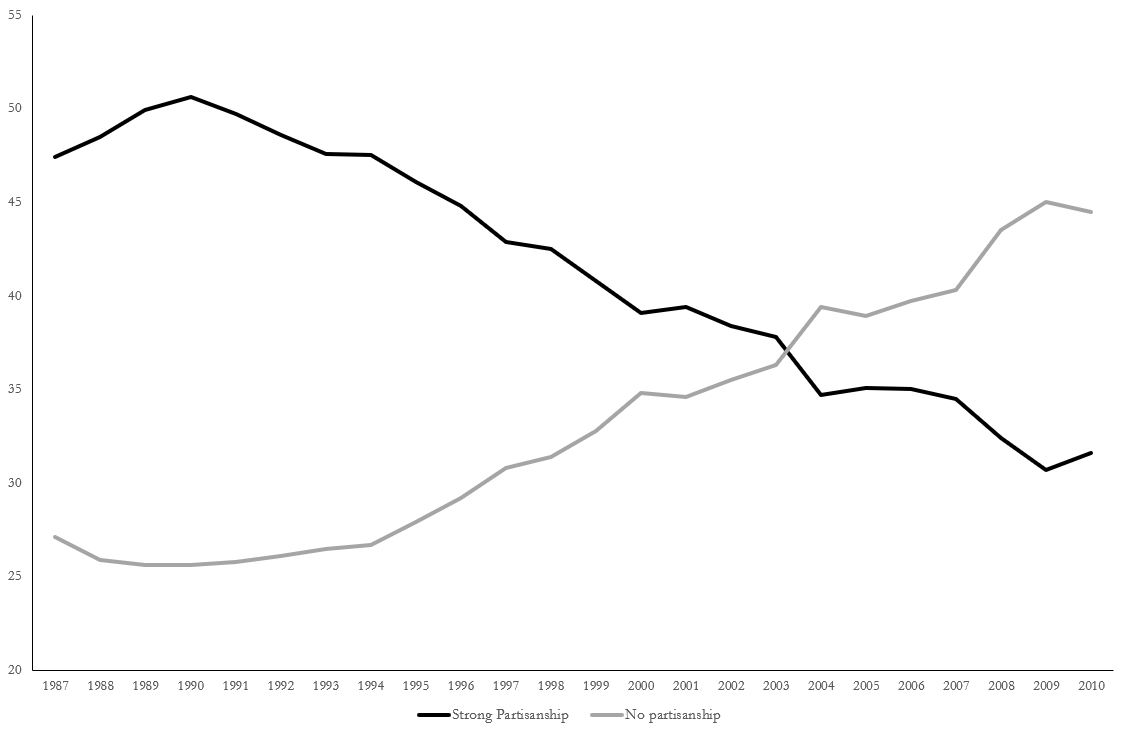
Half of voters expressed a strong party ID in late 1980s. By 2010, nearly half expressed no party ID
This decline in traditional party attachments opened up the political market, facilitating the volatile disruptions which began under the Coalition and have continued ever since
This decline in traditional party attachments opened up the political market, facilitating the volatile disruptions which began under the Coalition and have continued ever since
Time for Brexitland graph of the day #6 @ProfSobolewska
Today's graph documents the rise to the top of the political agenda of an issue with the potential to mobilise identity politics divides: immigration
Today's graph documents the rise to the top of the political agenda of an issue with the potential to mobilise identity politics divides: immigration
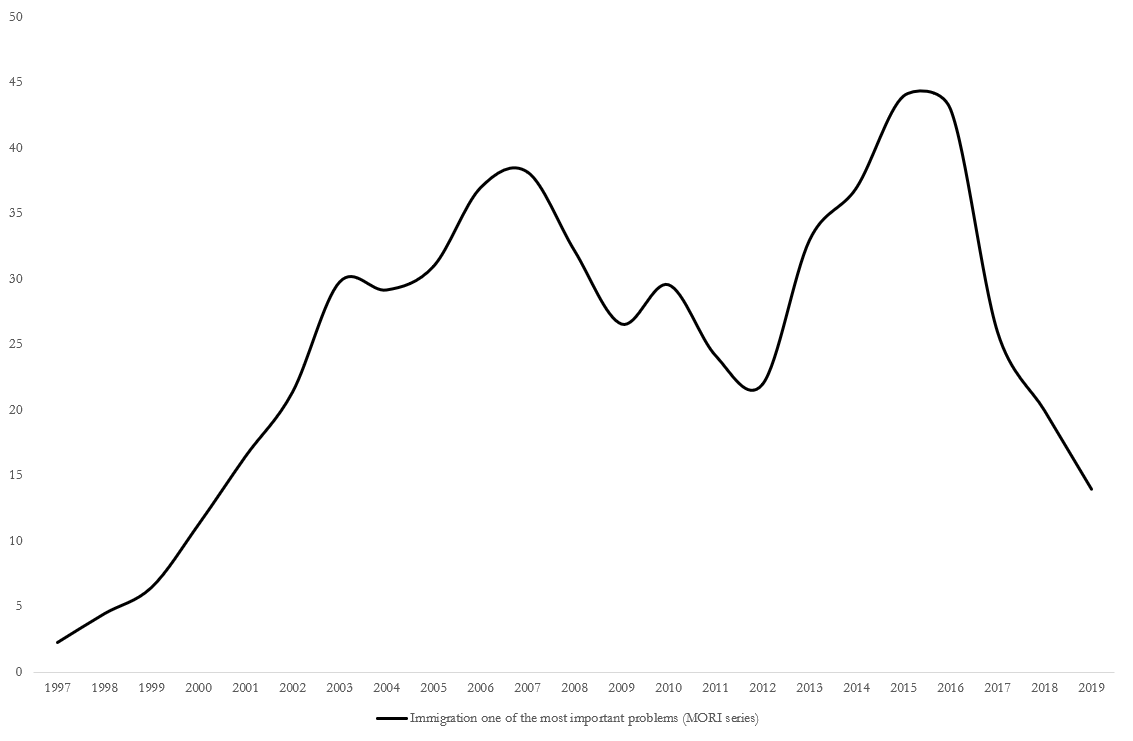
This is data from IPSOS-MORI's long running "most important problem" series, which records verbatim what people name unprompted as the most important issues of the day.
Immigration shot up the agenda in the early 2000s - by 2002 over 25% of voters were naming it.
Immigration shot up the agenda in the early 2000s - by 2002 over 25% of voters were naming it.
The issue then remained at or near the top of the agenda - named by 20-45% of voters month in, month out - for nearly 15 years thereafter. Immigration was a top concern even during the depths of the global financial crisis
Imm became the trigger issue which mobilised ethnocentric feelings of us against them, becoming a threatening outgroup which identity conservative voters focussed on and wanted controlled. They prioritised such control over all other issues through this period & voted accordingly
Time for the next Brexitland graph of the day @ProfSobolewska
This one shows why the growing salience of immigration mattered for our politics - it shifted votes. The graph shows the predicted probability of Labour voters switching to Cons in 2005 and 2010
This one shows why the growing salience of immigration mattered for our politics - it shifted votes. The graph shows the predicted probability of Labour voters switching to Cons in 2005 and 2010
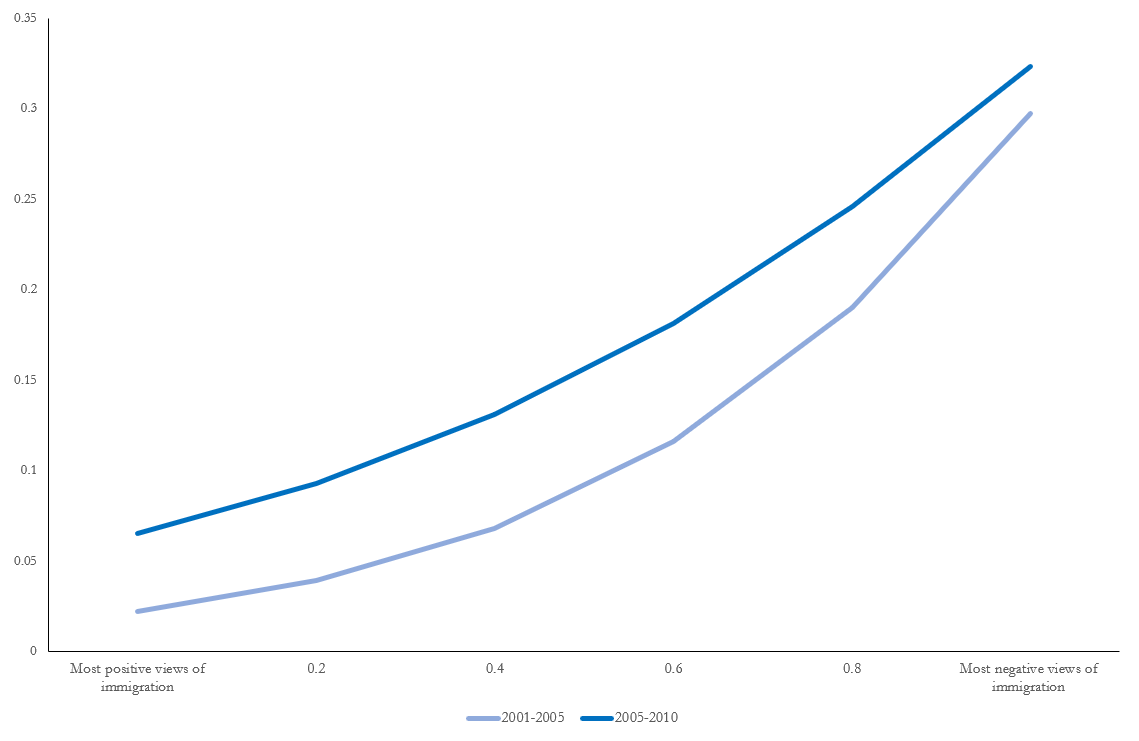
In both of the final elections of the New Lab govts (and indeed in 2001) negative views of imm & immigrants, and emphasising imm as a most important political problem, predicted switching from Labour to the Conservatives. Imm was an issue which really hurt Labour electorally
The political power of imm reflected the power of ethnocentric "us against them" psychology - ethoncentric voters far more likely to see imms as threat to be controlled - & political legacies/reputation: perception of Cons as the best party to do so a legacy of Powell/Thatcher
Time for the next Brexitland graph of the day. This chart shows net approve-disapprove ratings for Labour and the Conservatives betewen 2004 and 2013. The black dashed line marks when the Conservatives took office in Coalition with the Lib Dems 
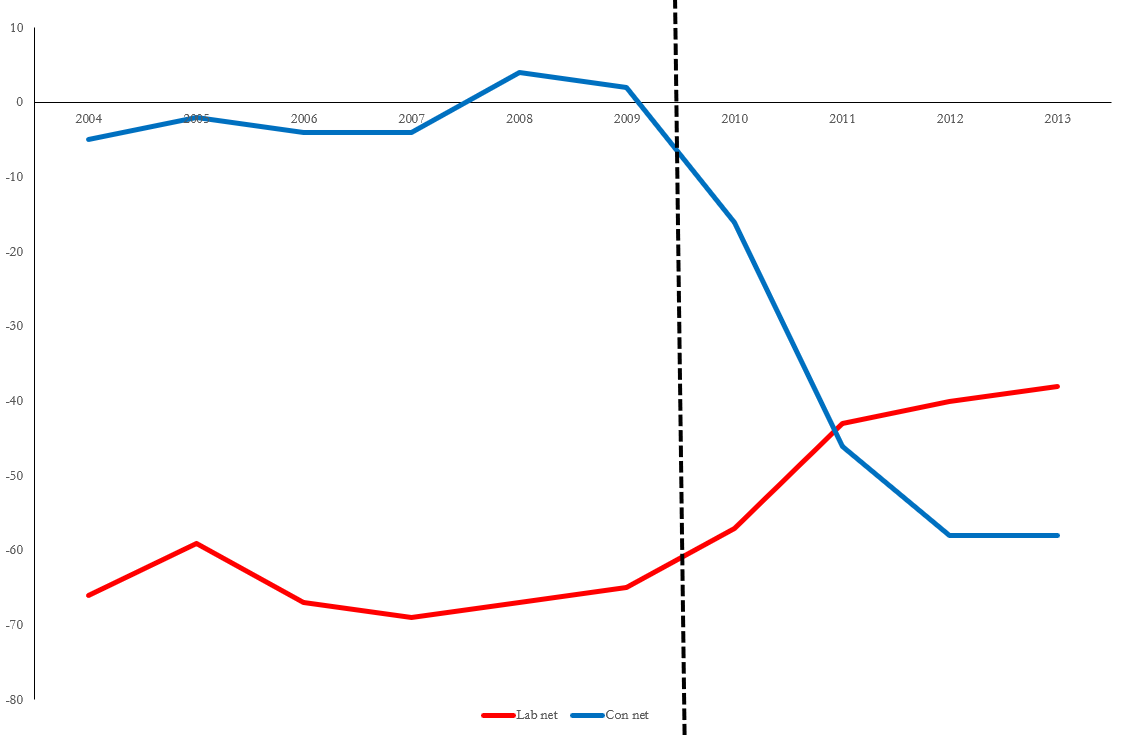
As the previous graphs had illustrated, the Conservative opposition gained in the 2000s by mobilising ethnocentric opposition to immigration, capitalising on an anti-imm reputation they had held since the 1960s.
What happened once they gained office? That reputation collapsed.
What happened once they gained office? That reputation collapsed.
The reason for this collapse is clear: Cameron and May promised a policy outcome (net migration under 100k) which was undeliverable. They stubbornly stuck to this commitment, despite repeatedly failing to get anywhere near delivering it. This was a potent way to destroy trust.
By repeatedly promising something they could not deliver, and refusing to level with voters about why they were failing to deliver, Cameron and May destroyed a 50 year reputational advantage on immigration in 18 months. By late 2011, the Cons were behind Labour on immigration.
UKIP's surge in the polls began soon after. The timing is no coincidence. The collapse in the Conservatives' reputation as a party of immigration control opened the door to a radical alternative able to address ethnocentric voters' concerns.
Time for another Brexitland graph of the day! High levels of voter concern about imm & Conservatives' failure on the issue, opened the door for radical right insurgent: UKIP. As this graph shows, UKIP support at its 2014 peak overwhelmingly concentrated among ethnocentric voters 
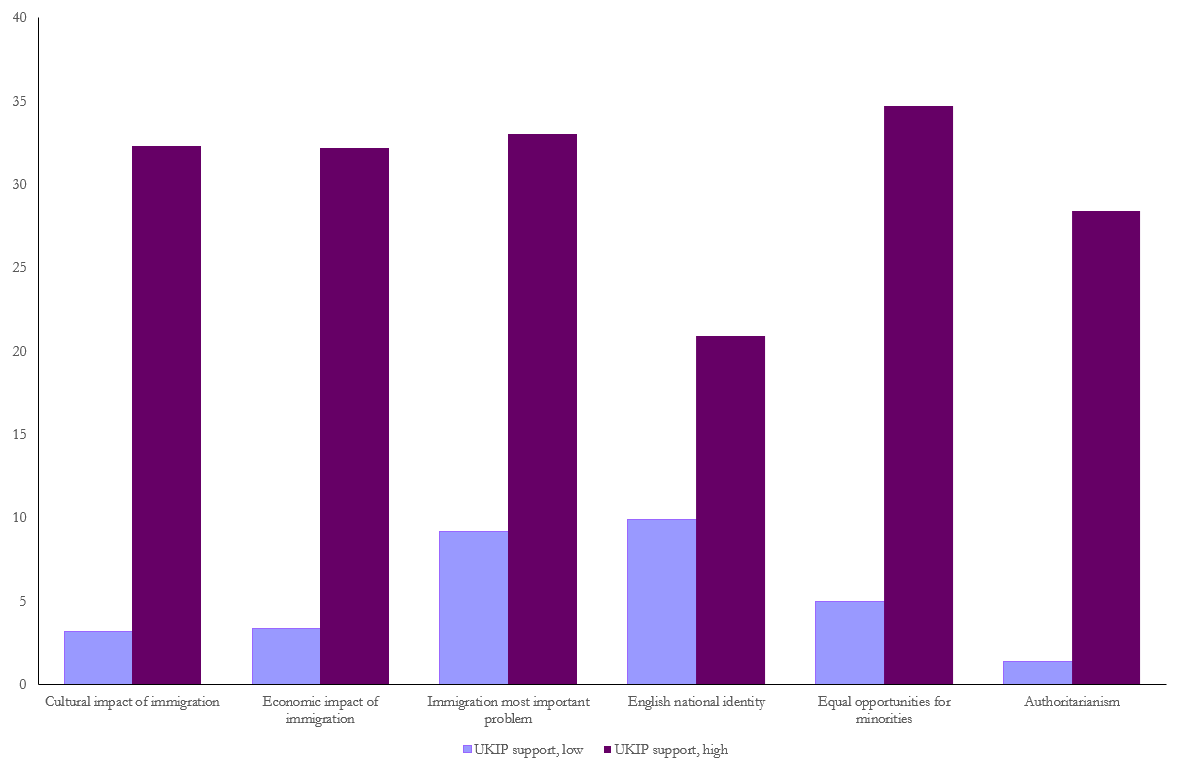
Most W European countries have a large rad rt party. But in Britain emergence of substantial party of this kind was delayed by the electoral system and (critically) alignment of ethnocentric voters with Conservatives. Cameron/May failure on the issue therefore a critical moment
Emergence of UKIP cements the linkage of immigration and EU in minds of British voters, and creates growing electoral pressure for Cons to offer something more radical on this issue agenda. Something like a renegotiation to secure imm control. Or a referendum.
Time for another Brexitland graph of the day! This graph shows changing social base of Labour support. In 1997, two thirds of Labour's vote came from white school leavers, and less than a fifth from graduates and ethnic minorities. By 2015, grads & ems were the majority... 
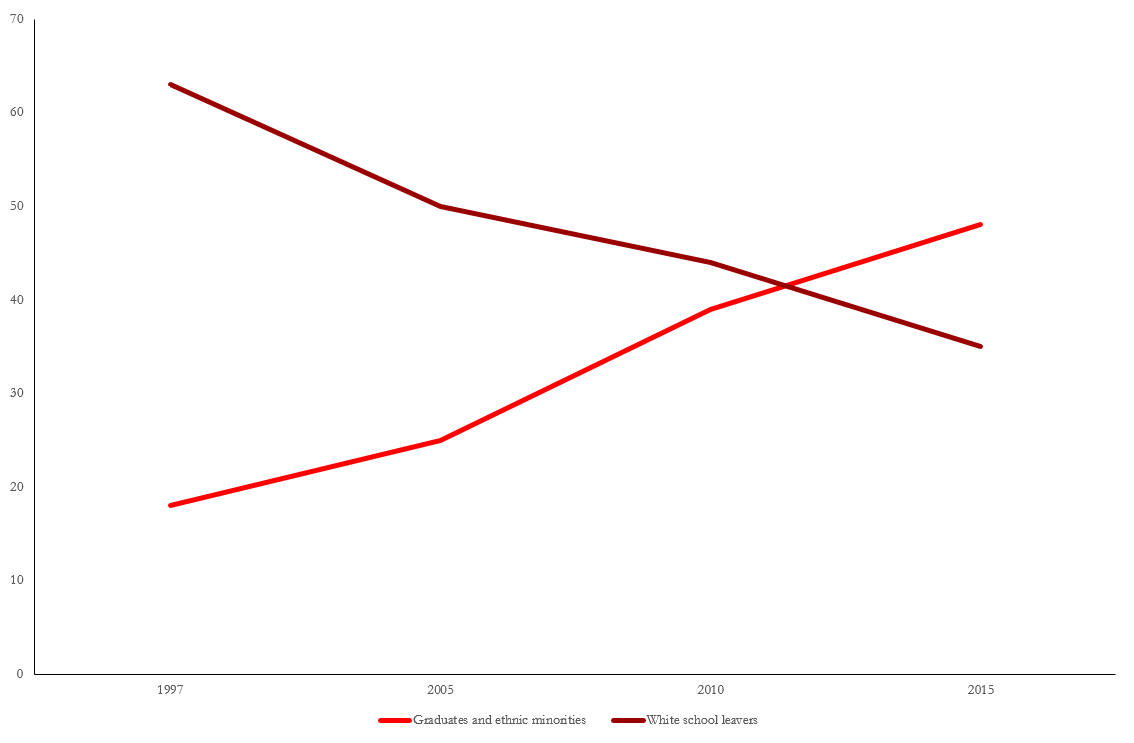
...and white school leavers had declined to under 40% of Labour's support. This transformation partly reflects LT social change, but also reflects circumstances of 2010-15, when Lab was losing ethnocentric white school leavers to UKIP at same time as it was gaining grads from LDs
This underlying demographic shift is really important. Before 2015, white school leavers had always been Labour's largest constituency (and hence had a v strong electoral voice in the party). After 2015, this ceased to be true. Lab became a majority identity liberal party.
This shift is unlikely to reverse - ID lib groups still growing & Lab appeal to ID cons fell further after 2015. But it continues to cause Lab electoral headaches. Its contemporary base is cosmopolital liberals.But seats it needs to win are still old, white, socially conservative
The latest Brexitland graph of the day takes us to the Brexit vote itself. Brexit divided the country, but in new ways quite at odds with typical voting patterns. This graph shows relationship between economic perceptions and vote choices in 2015 (Lab-Con) & 2016 (Leave-Remain) 
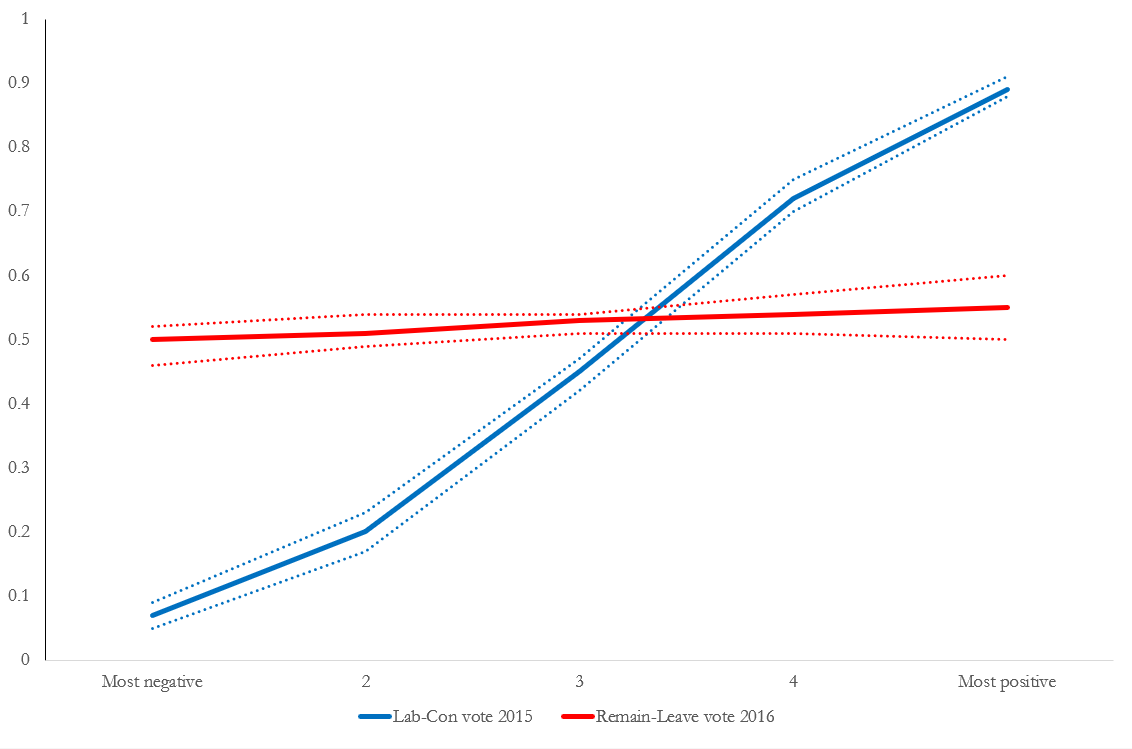
In 2015, as in most elections, we see a strong relationship between economic perceptions and vote choice - people who are positive about economic conditions voted for the incumbent Conservatives, those who were negative broke towards Labour.
In 2016? No relationship at all.
In 2016? No relationship at all.
This is something of a challenge for accounts which foreground the role of economic deprivation or discontent in driving the Leave vote - there simply isn't any relationship at all between negative economic perceptions and support for Brexit.
Brexit was more popular among "working class" voters (however defined) and (somewhat) more popular amongst those with lower incomes etc. But these correlations were largely driven by the distinctive identity politics alignments of such voters.
Time for another Brexitland graph of the day @ProfSobolewska
This one takes a look at the structural differences in support for Cons vs Lab in 2015 and Leave vs Remain a year later. We show the impact of class, income, education, ethnicity & generation in each vote
This one takes a look at the structural differences in support for Cons vs Lab in 2015 and Leave vs Remain a year later. We show the impact of class, income, education, ethnicity & generation in each vote

The graph highlights some stark differences. Class & income are strongest differentiators of vote in 2015: middle class & high income voters back Cons, working class and low income voters back Lab.
But in the Brexit vote the effect is both weaker and in the opposite direction
But in the Brexit vote the effect is both weaker and in the opposite direction
This is one of the things creating potential for electoral disruption later. Cons became identified with Leave, but their traditional class/income base backed Remain. Lab (gradually) became identified with Remain but their traditional class/income base backed Leave
Meanwhile, look at the start difference in the impact of education. Education is only a weak predictor of vote choices in 2015 (grads lean a little Con) but is a massive predictor of 2016 chocies (grads lean v heavily Remain, school leavers lean v heavily leave)
This is a second demographic driver of disruption after 2015 - Brexit activated the growing education divide in the population & mobilised it into Con vs Lab choices, increasing its impact (which had already been growing)
One source of the disruptive power of Brexit is thus the v different social structure of voting in the referendum: Brexit divided voters primarily by education and age; whereas even in 2015 Lab vs Con was still primarily a contest whose dividing lines were drawn by class & income
As we show in the book, and others have shown elsewhere, those class and income dividing lines were already fading & being disrupted before Brexit. But Brexit accelerated the process, with dramatic political consequences which we are still feeling today.
In today's Brexitland graph of the day @ProfSobolewska and I turn our attention to Scotland, where identity politics has marched to the beat of a different drum.This first chart highlights how ethnocentric "us against them" tendencies are just as widespread in Scotland as England 

The forms of ethnocentrism vary a little - Scottish respondents are somewhat less likely to express negative views of immigrants or Muslims, but somewhat more likely to say that birth or ancestry are essential elements of their national identity (thus excluding imms/EMs)
In both countries such ethnocentric attitudes are concentrated in the same demographic core of older white school leavers. However,the political mobilisation of this group has proceeded very differently in Scotland due to the greater salience of England/Westminster as an outgroup
Scottish "Angloscepticism" is widespread. More than a third of Scots white school leavers agree that English internal migrants threaten Scottish jobs & identity.
A third of this group say the UK govt "almost never" works in Scotland's interests. Nearly half of this same group say they have little or no trust in UK govt, and think Scotland gets less than its fair share of UK govt spend.
All such attitudes are more widely expressed by ethnocentric/identity conservative Scots than by identity liberal scots (graduates and ethnic minorities). Scottish Angloscepticism has a similar social/demographic base to Euroscepticism/immigration scepticism in Eng & Wales.
However, the political mobilisation of such sentiments has been very different in Scotland, and as a result its political expression and impact has also been very different. Tomorrow's graph of the day will take a look at that.
As America decides, today's Brexitland graph is a reminder of why politicians & campaigns matter - they can polarise nations or bring them together. Here @ProfSobolewska and I show the demographic divides in support for Scottish independence & Brexit pre & post referendum 

The SNP and the Scottish independence referendum pursued a bridge building strategy from the outset - winning support from ID conservatives by mobilising resentment of English/Westminster/Tory dominance, and ID liberals by offering a progressive, multicultural vision of Scotland
UKIP, Conservative Eurosceptics and the Leave campaign, by contrast, sought to polarise from the outset, seeking to intensely mobilise voter opposed to immigration, the EU and the political establishment, while offering little which could appeal to more liberal voters
The results are clear to see - the Scottish independence campaign grew support on both sides of the identity politics divide, while the EU refereendum campaign further deepened already deep divides in views of the EU between white school leavers and graduates/ethnic minorities
Demography is not destiny. It provides a set of options which politicians must choose between. The choices they make help shape or reshape the social divides which their successors face. Trends can be intensified or reversed. Political choices matter & have consequences.
• • •
Missing some Tweet in this thread? You can try to
force a refresh



